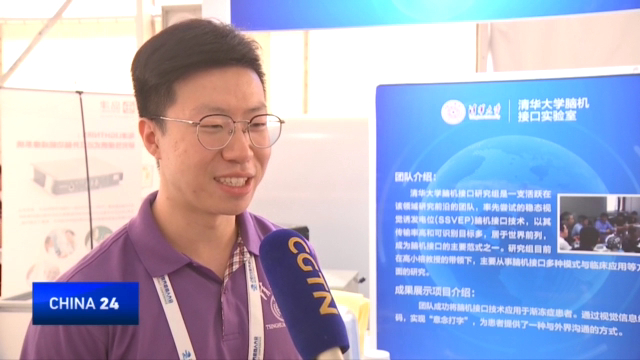
21:41, 22-Aug-2019
World Robot Conference: Brain computer interface technology on show
Updated
22:18, 22-Aug-2019

Brain-Computer Interaction may become the next big thing, acronym like A.I. and I.o.T. It's a technology that might bring "superman" into reality and at least looks to be able to read one's mind. As CGTN's Sun Ye shows us, BCI is already one of the buzzwords at this year's World Robot Conference.
He only needs to think.
No need to use his hands. No need for a keyboard.
We've asked him to mind-spell the Chinese characters for CGTN.
And with this system developed by Tsinghua University, which builds on Brain-Computer Interface technology, or BCI. He can.
The computer has picked up and deciphered the brain waves. And acted on them.
SUN YE BEIJING "The best subject for BCI technology is someone like him. Someone with a strong brain signal and is able to stay focused."
ZHOU BAISHUN TSINGHUA UNIVERSITY "You just need to focus on which consonant syllables you want to choose. When the system detects the choice. It appears. It needs a little more attention than just thinking."
SUN JINNAN TSINGHUA UNIVERSITY "We hope it can help people like Hawking, who have ALS, or Amyotrophic Lateral Sclerosis and can't move their bodies. Sadly the physicist passed away before the dawn of this technology."
The idea of brain-computer interface came into being decades ago.
Professor Gao Xiaorong, among the first to pursue the technology in China, says it's only recently that it's been proven scientifically feasible.
PROF. GAO XIAORONG TSINGHUA UNIVERSITY "The paradigm we started was for medical purposes, giving ALS and stroke patients new leases on active life. And after more than 10 years of research, the scientific arch has been acknowledged and accepted, it goes from brain-computer interface, then to interaction, and finally to brain-computer intelligence."
And now with technological advances, Gao says BCI has suddenly heralded even more broader possibilities.
PROF. GAO XIAORONG TSINGHUA UNIVERSITY "With artificial intelligence coming into the picture, BCI research has new branches. It's assumed that if human intelligence can bridge and work with the more powerful machine intelligence, the two intelligent agents can combine to become 'super-man'."
Gao says a "super-human" won't materialize in the near future.
But at the World Robot Conference's BCI section, participants are certainly trying to get there.
SITEMAP
Copyright © 2018 CGTN. Beijing ICP prepared NO.16065310-3
Copyright © 2018 CGTN. Beijing ICP prepared NO.16065310-3